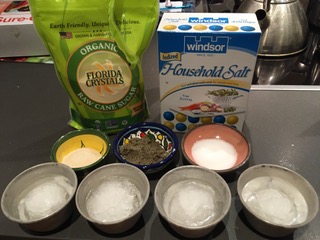
I.C.E. (Ice Cold Experiment)
Snow days are great fun for kids but the slippery roads and sidewalks that follow can be dangerous for drivers and pedestrians. After the snowstorm in Victoria, I wondered what substance would help to melt ice faster. I designed an experiment to compare salt, sugar, and sand to a control on the melting rate of ice. Knowing what substance melts ice fastest can be useful in making our sidewalks and roads safer by reducing slips and car accidents after it snows. For my experiment, I got sand from a nearby playground, and found table salt and sugar at home. I filled four equal-sized bowls with 75 ml of water and froze them in my freezer. I then sprinkled each ice bowl with either ½ teaspoon of salt, sugar, or sand. I left the fourth bowl as pure ice for the control. I labeled the four bowls and placed them in the fridge on the same shelf. I timed how long it took for about half of the ice to melt in any one of the bowls. I then measured the amount of melted water from each bowl and recorded the data in my log. After measuring, I poured the melted water back into the correct ice bowl and washed the funnel and measuring cup well. I then left the four ice bowls on the counter to melt completely and I kept timing them. I repeated my experiment four times to see if my results stayed the same. The salt always melted the ice much quicker than the sugar or sand. Sugar came in second. The sand and the control took the longest. I learned that both salt and sugar can lower the freezing temperature (freezing point) of water, but that salt does it much faster because there are more molecules in a teaspoon of salt compared to a teaspoon of sugar. Putting salt on roads and sidewalks after it snows would be the fastest way to melt ice and reduce accidents. In the future I would like to compare different types of salt to see which one works best. I am also interested in finding out how cold it has to be before salt is no longer able to lower the freezing point.



